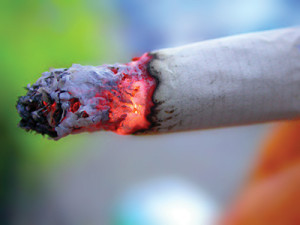A tobacco-free Ireland
 Ciarán Galway explores the challenges faced by the Government as it continues its crusade against smoking.
Ciarán Galway explores the challenges faced by the Government as it continues its crusade against smoking.
Each year, approximately 5,200 Irish people die from smoking-related illnesses. Last year, the overall prevalence of smoking was 19.5 per cent.
Since 2013, the Government has worked towards establishing a smoke-free Ireland. The Tobacco Free Ireland report, produced by the tobacco policy review group and endorsed by the Government, has acted as a framework for reducing the prevalence of smoking to less than 5 per cent of the population. Its two central themes are the protection of children and the ‘de-normalisation’ of smoking.
During Ireland’s EU presidency in the first half of 2013, a high priority was placed on implementing the European Commission’s proposal to tighten the regulation of tobacco products. Draft legislation was passed through the Council of Ministers; this allowed for 65 per cent of tobacco packaging to display health warnings and permitted the introduction of plain packaging. In spite of unprecedented lobbying by ‘big tobacco’, then Health Minister James Reilly and 15 European health ministers co-signed a letter addressed to MEPs, advocating the Directive. Similarly, Reilly and Enda Kenny wrote to every MEP within the European People’s Party group to appeal for support. Subsequently, the Tobacco Products Directive was successfully voted through the European Parliament.
In March, Ireland became the second country in the world to legislate for plain packaging (after Australia) and the first country in Europe to do so. The Government’s Public Health (Standardised Packaging of Tobacco) Act passed through both chambers of the Oireachtas without any opposition from TDs or senators and is set to be strictly enforced from May 2017; tobacco companies must begin the plain packaging process by May next year. Speaking at a recent international conference on tobacco and health, Children’s Minister Reilly stated: “We formed a coalition whose resolve was unshakeable. When the tobacco industry realised this, they changed their tactics. Japan Tobacco International (JTI), Imperial Tobacco and Philip Morris all threatened the Government with legal action should our legislation proceed. The legal letter from Japan Tobacco International was particularly aggressive.”
Indeed, JTI has brought a case before the Commercial Court, contending that, as an EU member state, Ireland cannot unilaterally engage in such an action. Currently, JTI Ireland Ltd is attempting to obtain a High Court order prohibiting the implementation of the Act.
The basis for the tobacco giant’s challenge is a contention that the legislation will infringe upon its intellectual property rights and freedom of expression. JTI also suggests that this will hinder the EU-wide harmonisation of manufacturing, presentation and sale of tobacco, thereby inhibiting imports to Ireland. This could constitute a restriction on trade which breaks the Treaty on the Functioning of the EU. The case is currently adjourned in the High Court.
Other government initiatives have included the promotion of tobacco-free campuses at third-level institutions, increased investment in social media campaigns, and the unanimous passage of legislation which prohibits smoking in cars where children are present. Further measures proposed in the Tobacco Free Ireland action plan include laws to prohibit smoking within schools and childcare facilities, tobacco-free healthcare, sporting and governmental facilities, and increased regulation of the tobacco retail environment e.g. prohibiting the sale of tobacco products by under-18s and sales from self-service machines.





